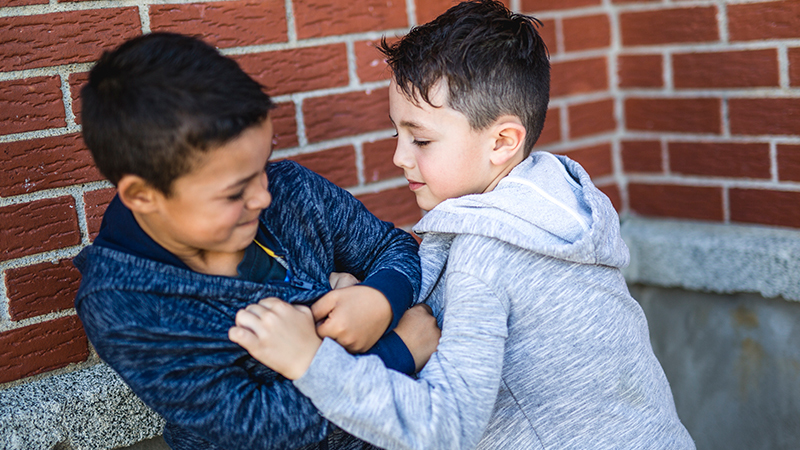Early in my career, while teaching at an inner-city elementary school, a student violently attacked another in my classroom. The student was late to school that day, and when he arrived, he calmly walked across the room to another boy and choked him. I raised my voice but had to physically place myself between them to stop the assault. I sent the boy to the hallway to wait while I calmed my class.
In the hallway, the boy revealed to me his father was physically abusive. The night before, his father’s abuse had escalated, and he had been arrested. The trauma from that incident had spilled over into the morning, and the boy physically was not capable of regulating his emotions. He made a public apology to the student and was punished with community service. More importantly, we were able to get him and his mom in family therapy and anger management.
Moments like these are dangerous and potentially explosive, but educators have the unique and challenging opportunity to help curb violence in classrooms. When we approach school fights with careful strategy, kindness and empathy, we can get at the root of the problem and begin to crack the code on bullying while protecting and helping as many students as we can.
Managing School Fights
Stop the Fight Before it Starts
If you see two students approaching each other in an aggressive way, verbally shock them out of their mindset. One way to do this is through humor. Humor is usually more effective in tense pre-fight situations than becoming angry and stressed.
Use Verbal Commands
Verbal commands are more effective before the fight begins. Remind them in a forceful way what is going to happen to them if they start to fight. You can say, “Remember, if you fight, you could face expulsion!” It is very important that you use your voice to try to break the tension. For example, you can say:
- “Okay, break it up.”
- “Security is on its way.”
- “Everybody stop what you’re doing.”
Do Not Get Physically Involved
Sometimes, stepping in will only put you in harm’s way.
Call for Security
The security personnel are trained to break up fights.
Disperse the Crowd
Having a large crowd around during a fight only escalates the situation. Check with your school’s code of conduct for regulations on those who watch and cheer on the fight. Making sure the crowd is minimal is essential; as a fight escalates or is broken up by security, bystanders may become unintentionally harmed.
Preventing School Fights
Fights in class don’t have to be part of your regular routine. A few simple strategies can help keep your students from escalating disagreements into fights.
Develop Strong Relationships with Your Students
Students will come to you first before resorting to violent or aggressive acts if they know you and trust you. Additionally, if a fight were to break out, you will be more likely to talk students down in the heat of the moment because of the relationship you’ve cultivated.
Teach Students How to Resolve Conflict Verbally
Teaching your students the value of using words to solve conflict is a lesson they will use their entire lives. You can work together as a class to develop a phrase to help start the resolution process. For example, “Let’s find a way to work together.” Learning to discuss desired outcomes and their feelings keeps them from assigning blame and focusing on the cause of the conflict.
Work on Anger Management Strategies
One method is to create school-wide units about anger management that can be conducted in home rooms. In these units, you can teach students how to identify their stress triggers and teach de-stressing strategies, such as counting backward from 10 or externalizing their anger by squeezing a ball. Alternatively, you could develop a code word as a class that students can use when they feel angry. Students call out this word any time during the day, even if it may interrupt a lesson. This way, they can alert the adult in the area that they are about to lose control, and you can take steps to help them calm down. Even though using a called-out code word may seem disruptive, it’s a lot less disruptive than a full-fledged fight.
Set Expectations Early
Review school and classroom expectations regarding fights with your students. An effective strategy is to have students be part of the classroom expectation-setting process based on your ideas and school policy. By allowing them the opportunity to co-author the expectations, you are more likely to increase buy in. Plus, students will already know the consequences of a fight and be less likely to engage in one.
Focus on Kindness and Acceptance
You can develop a kindness week and focus on target areas that your students and school need to improve on to become more inclusive and less divided.
Provide Counseling Resources
Some students need counseling and other services, such as anger management, to help them deal with anger or troubled homes.
Encourage Parent Involvement
This is especially important for those students who cause the most issues with fighting. By having parents involved in the school, your students will feel more supported by and integrated into the community, and they’ll realize that school isn’t a place to unleash.






